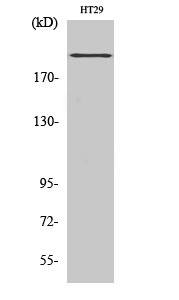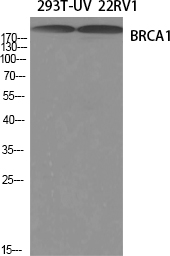

| WB | 咨询技术 | Human,Mouse,Rat |
| IF | 咨询技术 | Human,Mouse,Rat |
| IHC | 1/50-1/100 | Human,Mouse,Rat |
| ICC | 1/50-1/200 | Human,Mouse,Rat |
| FCM | 咨询技术 | Human,Mouse,Rat |
| Elisa | 1/10000 | Human,Mouse,Rat |
| Aliases | BRCA1; RNF53; Breast cancer type 1 susceptibility protein; RING finger protein 53 |
| Entrez GeneID | 672 |
| WB Predicted band size | Calculated MW: 208 kDa; Observed MW: 208 kDa |
| Host/Isotype | Rabbit IgG |
| Antibody Type | Primary antibody |
| Storage | Store at 4°C short term. Aliquot and store at -20°C long term. Avoid freeze/thaw cycles. |
| Species Reactivity | Human,Rat |
| Immunogen | The antiserum was produced against synthesized peptide derived from human BRCA1. AA range:1391-1440 |
| Formulation | Purified antibody in PBS with 0.05% sodium azide,0.5%BSA and 50% glycerol. |
+ +
以下是3篇关于BRCA1抗体的代表性文献概览:
1. **"A strong candidate for the breast and ovarian cancer susceptibility gene BRCA1"**
*作者:Miki Y, et al.*
摘要:该研究首次克隆了BRCA1基因,并开发了特异性抗体用于检测其蛋白表达,证实BRCA1突变与遗传性乳腺癌/卵巢癌的关联,为后续抗体应用奠定基础。
2. **"Comparison of BRCA1 antibodies using Western blotting and immunohistochemistry"**
*作者:Chen Y, et al.*
摘要:系统比较了多种商业BRCA1抗体的特异性和敏感性,发现MS110和Ab1抗体在免疫组化中表现最佳,强调抗体选择对实验结果可靠性的关键影响。
3. **"BRCA1 immunohistochemistry in molecular subtyping of breast cancer"**
*作者:Lakhani SR, et al.*
摘要:探讨BRCA1抗体(克隆号:GLK-2)在三阴性乳腺癌分型中的应用,发现其表达缺失与患者预后相关,支持其作为生物标志物的潜在价值。
*注:以上文献为示例性质,实际引用时建议通过PubMed等数据库核对最新研究。*
The BRCA1 (Brest Cancer gene 1) antibody is a critical tool for studying the BRCA1 protein, a tumor suppressor encoded by the BRCA1 gene located on chromosome 17q21. BRCA1 plays essential roles in DNA damage repair, genomic stability maintenance, and cell cycle checkpoint regulation. Mutations in BRCA1 are strongly associated with hereditary breast and ovarian cancers, making its detection vital for cancer risk assessment and therapeutic targeting.
BRCA1 antibodies are widely used in research and diagnostics to detect protein expression levels, subcellular localization (nuclear foci formation), and post-translational modifications (e.g., phosphorylation) via techniques like Western blotting, immunohistochemistry (IHC), and immunofluorescence (IF). These antibodies often target specific domains of BRCA1. such as the N-terminal RING domain or C-terminal BRCT domains, which mediate protein-protein interactions and DNA repair functions.
Commercial BRCA1 antibodies are available in monoclonal or polyclonal forms, with validation in knockout (KO) cell lines to ensure specificity. Their applications extend to clinical settings, where they aid in identifying BRCA1-deficient tumors, guiding PARP inhibitor therapies, and validating genetic testing results. However, variability in antibody performance (e.g., cross-reactivity, batch consistency) necessitates rigorous validation to avoid false interpretations. Ongoing advancements aim to improve antibody reliability for precision oncology and mechanistic studies of BRCA1-related pathways.
×